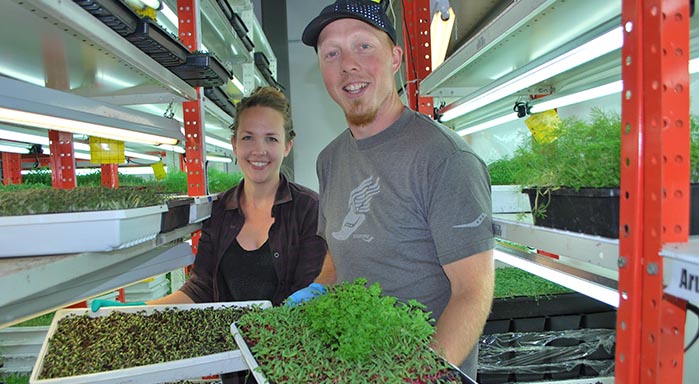
ALES alumni Cathryn Sprague and Ryan Mason of Reclaim Urban Farm grow greens and vegetables on borrowed residential and institutional lands near Whyte Avenue, and also an array of microgreens at their indoor location.
It's a lovely Friday afternoon in September, but while Cathryn Sprague and Ryan Mason are the bosses at Reclaim Urban Farm neither is cutting the day short and their workweek is far from over - if it ever is.
Their embrace of unglamorous hard work to make urban microfarming feasible is one reason why the Faculty of ALES grads will receive an Alumni Innovation Award on September 22, during the University of Alberta Alumni Awards.
So far this day, the duo has assembled 30 boxes stuffed with squashes, potatoes, and other seasonal vegetables and greens for pickup by customers who've prepaid for 15 weeks of fare. Now, they're packing scores of small boxes with fresh-as-today salad greens in gorgeous varieties. At dawn Saturday, they'll haul those to the City Market Downtown to sell. Three times weekly, they re-plant luscious microgreens and herbs at an indoor loft at their packing site. At 14 outdoor locations, they plan to harvest produce until early November. Then there's marketing, which consumes about 50 per cent of their effort, said Mason.
The alumni awards recognize graduates who are upholding the promise to use their education for the public good. Sprague and Mason qualify on multiple counts.
Reclaim Urban Farm "reclaims" front and backyards, empty lots and community gardens in neighbourhoods bordering Whyte Avenue to grow food. In return for lending their land, owners receive a weekly box of produce during the season and the rest is sold by Reclaim.
With four large lots, 11 small plots and the indoor microgreen operation, they seed less than a hectare in total land mass. Yet they produce upwards of 180 kilograms of mostly leafy greens and herbs weekly in the summer, and about 225 kg of food in the fall, when vegetables such as tomatoes and squash come in. All of this proves the value of unused urban land and how it might improve urban food security. It also appeals to customers who believe in shrinking their carbon footprint by eating locally grown food.
Sprague and Mason, who each earned a master's in environmental sociology from the Faculty of ALES two years ago, work 12 hours-a-day starting in April. And it's six- or seven-days-a-week. "Someone has to water (the microgreens) everyday," said Sprague. "We take turns on Sundays."
Those microgreens are an important element of their success, because restaurants wanting a local supply of unusual ingredients are steady customers.
"We've found our niche producing unique varieties," said Sprague.
A short list includes the herbs purslane, lovage and shiso; such edible flowers and weeds as borage and chickweed; microgreens that include mizuna and cress; five types of hot pepper, and several varieties of heirloom tomato.
While Sprague grew up helping tend her grandmother's garden and Mason's family ran a broiler-breeder chicken farm when he was young, the inspiration for Reclaim actually arose from the duo's separate trips abroad. Mason saw farmers in Cuba making small-scale farming viable. Sprague was impressed byJapan's volume of urban gardens. "It's everywhere and everyone accepts it."
Reclaim is on the leading edge of that in Edmonton. It tripled production in its second year of operation, supplies 40 restaurants regularly, and offers a season's worth of veggies in a weekly program called Community Supported Agriculture. CSA links farmers to city-dwellers with fresh healthy food, helps transmit knowledge about farming, reduces food waste and improves Reclaim's financial sustainability.
Next, Reclaim is doubling its microgreens operation, and sourcing more large lots to increase its efficiency. But the Holy Grail for these urban market farmers is something most other farmers take for granted: "We're working toward permanent, long-term land leases," said Mason.